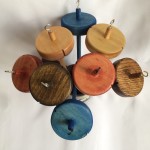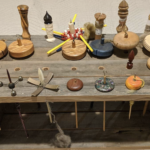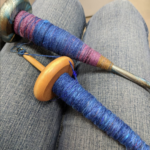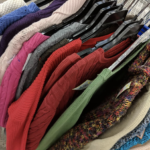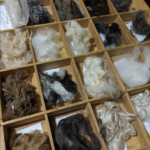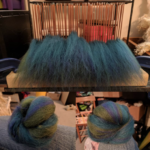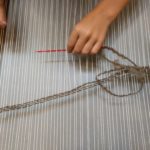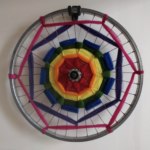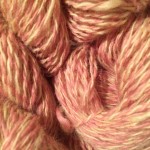Contact me anytime to set up a private lesson or group class. Lessons and classes can take place at a location of your choosing, including virtually – we do not have classroom space at the studio. All group classes can be offered as individual lessons.
Possible classes might include:
- Beginner Drop Spinning and Plying Techniques
- Intermediate Drop Spinning
- Spindle Plying Techniques
- Yarn on a Budget – Upcycling Sweaters
- Spinning Unraveled Sweater Yarn
- Fiber, Yarn & Cloth: A Journey
- Intro to Fiber & Wool
- Blending Fibers for Color & Fiber Types
- Intro to Fiber Tools: Fiber Prep, Blending & Spinning
- From Raw Fiber to Finished Project
- Useful Knots & Yarn Handling Techniques
- Wet-Felting Soap
- Beginner Tapestry Weaving
- Bicycle Wheel Weaving
- Natural Dyeing
Beginner Drop Spinning and Plying Techniques
- Time: 1-6 hours (includes drop spindle and wool)
Learn how to spin your own yarn from natural fibers without the hassle and cost of a spinning wheel. In this class, we will learn the basics of spindles and wool, will draft fibers, and will practice spinning on a drop spindle to create the first half of a yarn skein. All attendees will go home with handspun yarn that they have made and a handmade drop spindle.
*In an extended class, we will learn about differences between drop spindles and support spindles and look at several examples of each, discussing many of the attributes that affect the spin and why some spindles are better under certain circumstances. Examples include the differences between top- and bottom-whorl spindles, the size of whorls, spindle lengths, density of materials, and fiber types. At the end of the extended class, participants will learn about multiple plying techniques, 2-ply vs 3-ply, yarn weight, a balanced yarn, and how to finish their yarn for the best effect.
Intermediate Drop Spinning
- Time: 2-3 hours (includes fiber)
So you’ve learned how to drop spin! Now what? Join us on an exploration of next steps. In this class, we will: practice standing and moving around while drop spinning; learn some spinning techniques; spin a variety of fibers; try out drop spindles with different physics and learn how to adjust accordingly; and break down your current spinning practice to improve different elements and get the yarn that you want.
Spindle Plying Techniques
- Time: 2-3 hours (includes singles to practice with)
So you’ve spun some yarn on your drop spindle – now what? In this class, participants will learn several methods of how to ply their single-spun yarn – using an Andean bracelet, a center-pull ball, a makeshift Lazy Kate, and chain- or Navajo-plying. If you have something already spun and ready to go, bring it with you. Samples will also be provided for practicing with.
Yarn on a Budget – Upcycling Sweaters
- Time: 3-4 hours (includes a thrifted sweater)
Unraveling knit sweaters can provide you with plenty of high-quality yarn (up to a mile!) at a very low cost, but not all sweaters are made equal. Learn how to choose the right sweater to unravel, de-seam a sweater (the hard part!), and unravel it (the fun part!). As time allows, share your bounty with others in the class and learn how to spin the different sweaters together to make a new yarn, completely unique (no previous spinning experience required). Every student will be provided with one thrift-store sweater to keep. Feel free to bring a sweater from home to learn more about it. There will be tools to share, but feel free to bring a ball winder if you have one and any tools that might help you see detailed work.
Spinning Unraveled Sweater Yarn
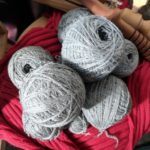
- Time: 3 hours (includes unraveled sweater yarn)
How many types of yarn can you spin with unraveled sweater yarn? From light weight to heavy weight yarn; barber-poled, cabled, and creped yarn; as well as a variety of art yarn, in this class, we’ll explore all of the yarn that you can create from 1-3 unraveled, thrifted sweaters. You must bring your own spinning wheel.
Fiber, Yarn & Cloth: A Journey
- Time: 2-3 hours
Where does your yarn and clothing come from? Where is it going? In this interactive class, we will discuss fiber sources, supply chains, processing and manufacturing, scale, and circularity. We will use large maps to display the journey of pre-researched fiber-based products and, as time allows, discuss and research fiber, yarn, and/or clothing that participants bring to class.
Intro to Fiber & Wool
- Time: 3 hours
- Cost: $35/student
Want to learn more about natural fibers and wool? In this class, students will learn about plant and animal fibers and their attributes by examining their physical properties and processing those fibers from their raw form. We will examine a variety of fiber and wool breed samples and will discuss what we observe visually and tactilely and what attributes result from those observations. We will continue our observations and discussion while physically processing raw materials, walking through the various stages of processing wool – skirting, scouring (where we’ll talk about lanolin), picking, and carding (where we’ll talk about differences in yarn attributes that result from different methods of preparation).
Blending Fibers for Color & Fiber Types
- Time: 2 hours (includes fiber)
Multiple blending tools – a drum carder, blending board, hackle/combs, and hand carders – will be demonstrated, and participants will get to try each one. We will discuss the different ways wool can be prepped for spinning – rolags, roving, batts, nests, vertical stripping, and horizontal stripping – and how it can affect the attributes of the finished yarn. We’ll also discuss blending for color and blending different fiber types. Students will select approximately 3 oz of fiber and add-ons to blend on a tool of their choice.
Intro to Fiber Tools: Fiber Prep, Blending & Spinning
- Time: 3 hours
This fast-paced class is all about breadth. Get direct, hands-on experience with a large variety of fiber tools, including processing tools (box picker, hand carders, combs, flicker, drum carder), blending tools (blending board, hackle, drum carder), spinning tools (drop spindles, nostepinnes, plying wand), and measuring tools (niddy noddy, WPI keys, etc).
From Raw Fiber to Finished Project
- Time: 2-3 days (includes fiber and a spindle)
Part 1 will include an introduction to fiber and wool, examining various fibers’ physical properties and processing those fibers from their raw form. We will examine a variety of fiber and wool breed samples and will discuss what we observe visually and tactilely as well as what attributes result from those observations. We will continue our observations and discussion while physically processing raw materials, walking through the various stages of processing a wool fleece – skirting, scouring, picking, and carding/combing.
Part 2 will include learning how to drop spin. We will learn the basics of drop spindles and how to spin on them, working in pairs and breaking down each movement required into smaller, more digestible bits. We will also cover plying and how to finish your yarn. We will then spin the yarn prepped in Part 1. All attendees will receive a drop spindle to keep.
Part 3 will include using the handspun yarn from Part 2 in small crochet, knit, and weaving projects. More yarn will be spun as needed, with specific intent towards each project, portraying the differences in prep and spinning and how that affects end-projects.
Useful Knots & Yarn Handling Techniques
- Time: 1-2 hours
In this class, we’ll cover the basics of handling and working with yarn, including: basic knots – like slip knots, half hitches, and square knots; types of joins; the butterfly technique; how to create and skein hanks; and how to create center pull balls by hand.
Beginner Tapestry Weaving
- Time: 3 hours (includes a small lasercut tapestry loom and weaving materials)
Using lap-sized, all-in-one laser-cut weaving looms that students will take home with them, participants will create a small tapestry using a variety of fiber-based materials (yarn, wool, locks, etc) and will learn a variety of weaving techniques. After looking at some examples and talking about a few basic design principles, participants will use colored pencils to create a rough design for their tapestry, working on intentionality. Then they will learn how to warp a basic frame loom as well as different methods of weaving techniques in order to create a variety of textured effects.
Bicycle Wheel Weaving
- Time: 3 hours (includes a wheel and fiber)
Turn a used, headed-for-the-dump bicycle wheel into a work of art! Learn how to weave in the round, using wool roving and design techniques similar to Ojos de Dios (God’s eyes). Students will take home a bike wheel, enough wool roving to finish their weaving, and a guitar wall mount to hang it on.
Natural Dyeing
- Time: Approx. 3 hours*
- Cost: $70/student = $50 lesson + $20 materials fee (includes glass jars, wool and/or yarn to dye, and dye materials)
Participants will learn the basic principles of natural dyeing – including fiber dyeing attributes, pre- and post-mordanting, pH, color-shifting, and over-dyeing – as well as the importance of foraging and dyeing sustainably.
If time allows, we will forage for local materials. During that time, we will discuss sustainably foraging, taking only 10-20% of materials so as to minimally affect the micro-ecosystem and so as not to accidentally eliminate any populations.
We will then use both those collected dye materials as well as other materials to create solar dyeing jars. While creating the jars, we’ll discuss ratios of dye material to the materials being dyed, how and why different types of fiber/textiles dye differently, changing the pH or adding iron to shift the color of the dye, and over-dyeing darker natural materials or over-dyeing already dyed materials to achieve different colors.
Participants will take their solar dye jars home where they will dry the dyed wool/yarn, rinse, and dry them again.
